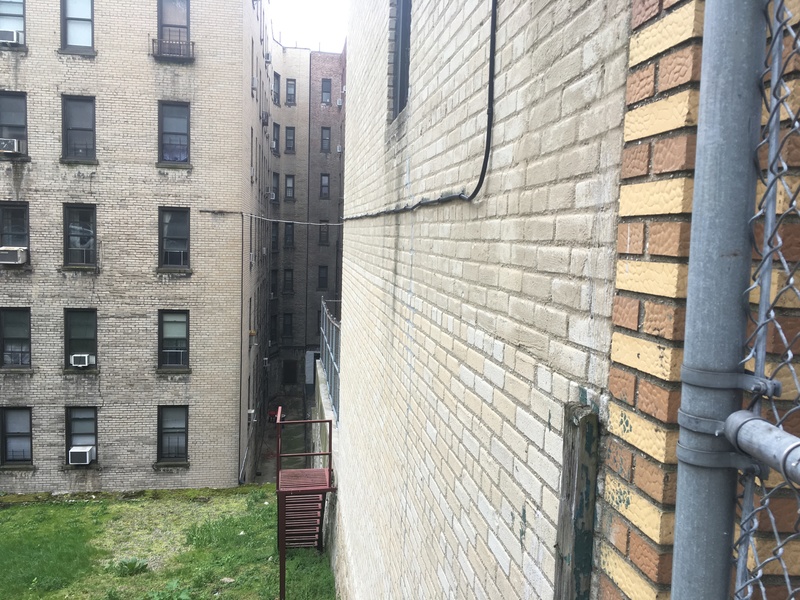Item
Window Series #7
Title (Dublin Core)
Window Series #7
Disclaimer (Dublin Core)
DISCLAIMER: This item may have been submitted in response to a school assignment. See Linked Data.
Description (Dublin Core)
In mid-march my school transitioned to virtual classes and sent everyone home for the semester. I've mostly been at home in Manhattan since then; the last time I rode the subway, previously a daily occurrence, was over six weeks ago now.
At home and in the neighborhood nearby since then, I feel as though I can look out the window onto a previous version of myself that could not have anticipated any of this. I also feel as though I look at myself now through a window, because after over a month, this all still feels fake in a way. It’s as though time has been suspended and I’m watching myself filling that time that “doesn’t count.” There is a numbness that comes with not being able to do any of what we’re used to and not being able to see people who we thought nothing of seeing every day in the past. The window analogy is both a way of conceptualizing but also deliberately engaging in that numbness and removing oneself from the reality of the situation, perhaps on both a personal and global level. It’s also a way of rebuilding the wall that has been breached by collision of home with the spaces that are normally outside of it, like work and school, and are now part of the same physical setting, albeit digitally.
This has made me think a lot about windows, which are everywhere in New York, and so I started to take pictures of windows in buildings I passed while going for walks. The windows themselves all look similar; despite differences in architectural style, they are all in essence the same glass barrier between inside and outside and public and private. It’s not something specific to life in a pandemic, but during this time it is especially relevant because for people staying mostly at home, our windows are potentially the only glimpse of the outside that we’ll see in a day. They divide our former lives and everything that we’d normally be doing outside of home from our current lives that have suspended many of those activities and digitized others.
It’s easier to think about these private separate lives going on behind the windows I pass when there are fewer people out on the street. Normally the act of passing people as I walk is more engaging than what I can’t see in the closed-off apartment buildings, but now there is not a lot going on in the streets. It’s interesting to think I’m probably closer in distance to people behind the walls of the ground floors of buildings than the people I can see on the street, especially on the less busy streets that are particularly empty these days.
At home and in the neighborhood nearby since then, I feel as though I can look out the window onto a previous version of myself that could not have anticipated any of this. I also feel as though I look at myself now through a window, because after over a month, this all still feels fake in a way. It’s as though time has been suspended and I’m watching myself filling that time that “doesn’t count.” There is a numbness that comes with not being able to do any of what we’re used to and not being able to see people who we thought nothing of seeing every day in the past. The window analogy is both a way of conceptualizing but also deliberately engaging in that numbness and removing oneself from the reality of the situation, perhaps on both a personal and global level. It’s also a way of rebuilding the wall that has been breached by collision of home with the spaces that are normally outside of it, like work and school, and are now part of the same physical setting, albeit digitally.
This has made me think a lot about windows, which are everywhere in New York, and so I started to take pictures of windows in buildings I passed while going for walks. The windows themselves all look similar; despite differences in architectural style, they are all in essence the same glass barrier between inside and outside and public and private. It’s not something specific to life in a pandemic, but during this time it is especially relevant because for people staying mostly at home, our windows are potentially the only glimpse of the outside that we’ll see in a day. They divide our former lives and everything that we’d normally be doing outside of home from our current lives that have suspended many of those activities and digitized others.
It’s easier to think about these private separate lives going on behind the windows I pass when there are fewer people out on the street. Normally the act of passing people as I walk is more engaging than what I can’t see in the closed-off apartment buildings, but now there is not a lot going on in the streets. It’s interesting to think I’m probably closer in distance to people behind the walls of the ground floors of buildings than the people I can see on the street, especially on the less busy streets that are particularly empty these days.
Date (Dublin Core)
Creator (Dublin Core)
Contributor (Dublin Core)
Type (Dublin Core)
photograph
Controlled Vocabulary (Dublin Core)
Curator's Tags (Omeka Classic)
Collecting Institution (Bibliographic Ontology)
Fordham University
VART3030
Date Submitted (Dublin Core)
04/27/2020
Date Modified (Dublin Core)
12/10/2020
Accrual Method (Dublin Core)
3017

